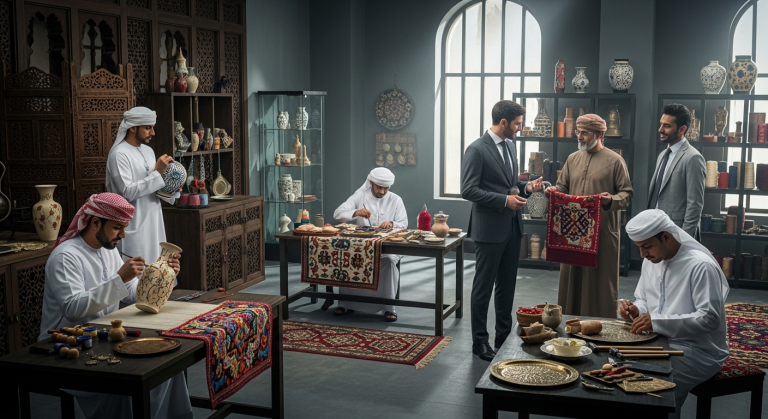Market Analysis and Opportunities
Dubai, as the leading business hub of the United Arab Emirates, has witnessed a surge of interest in Traditional handicraft production. This sector combines rich cultural heritage with growing global demand, offering significant business opportunities for entrepreneurs, investors, and managers. Market analysis in Dubai reveals an evolving ecosystem where traditional handicrafts are not just artistic outputs but also valuable commodities in tourism, retail, and export.
Target Market Analysis
- Market Size & Growth: According to the UAE Ministry of Economy, the country’s creative industries, which include handicrafts, contributed approximately AED 23 billion to the national GDP in 2022, with Dubai accounting for a major share due to its tourism and retail strength. The market has seen a 7% CAGR over the last five years, with future growth expected as Expo development and cultural initiatives continue.
- Consumer Preferences: Residents, expatriates, and international tourists are key consumers. Tourists seeking authentic Arabian experiences and luxury souvenirs increasingly prefer handcrafted goods. Corporate buyers source traditional gifts and décor, supporting both B2B and B2C segments.
- Key Trends:
- Digital transformation with E-commerce platforms and online marketplaces.
- Rising awareness of sustainability, promoting eco-friendly materials and ethical production practices.
- Desire for customization and unique designs.
Marketing Needs
- Market Research: Periodic consumer surveys and competitor benchmarking are vital to adapting products and prices for evolving tastes.
- Digital Campaigns: Investing in SEO-optimized web presence, social media marketing (Instagram, Facebook), and PPC ads is crucial. Collaborating with influencers popular in the UAE enhances market reach.
- Branding Strategies: Narrative-driven branding that emphasizes cultural authenticity attracts both consumers and businesses. A strong visual identity is essential across digital and offline media.
- Recommended Tactics:
- Partner with UAE-based travel agencies and hotels for gift shop placements.
- Host online workshops or virtual tours to engage global audiences.
- Participate in craft fairs and expositions, particularly in Dubai Design District (d3).
Expansion Potential
- Opportunity for regional expansion to other Emirates and the wider GCC market, especially Qatar and Saudi Arabia, which share similar cultural affinities.
- Entry into new segments, such as high-end hospitality, interior design, and corporate gifting, is feasible with quality and branding upgrades.
- Developing export-oriented operations can leverage Dubai’s logistics infrastructure, connecting to Europe, Asia, and Africa.
Comprehensive Business Overview
Traditional handicraft production in the UAE encompasses the creation of artisanal goods such as pottery, weaving, embroidery, woodwork, metalwork, and perfumery, rooted in Emirati heritage. These handcrafted products are produced via manual or semi-manual processes, appealing to consumers seeking authenticity and cultural connection.
- Industry: Creative industries, manufacturing, cultural tourism, luxury retail.
- Business Model: Combination of direct-to-consumer sales (via retail, e-commerce), B2B supply (hotels, event organizers), and export. Customization services (corporate branding, bespoke gifts) offer high-margin add-ons.
- Target Audience: UAE residents, expatriate communities, international tourists, corporations, and exports to overseas markets.
- Operational Scope: Production occurs in owned workshops or shared artisan spaces, with distribution through retail outlets, online platforms, and trade shows.
Mission, Vision, and Core Objectives
- Mission: To preserve and promote Emirati culture by delivering high-quality handcrafted products that delight customers and support sustainable growth.
- Vision: To become a leading regional and global ambassador for UAE traditional crafts, setting standards in quality, authenticity, and innovation.
- Core Objectives:
- Enhance product quality while safeguarding traditional methods.
- Expand market reach across Dubai, the UAE, and international markets.
- Promote sustainable, eco-friendly practices in sourcing and production.
- Support local artisans through training and fair employment.
The business’s current stage is typically in growth, leveraging Dubai’s Free Zones such as Dubai Design District (d3) or Dubai Multi Commodities Centre (DMCC) for logistical and operational advantages.
Competitive Advantage
Unique Value Proposition (UVP) and Key Strengths
- For Entrepreneurs:
- Low entry barriers for small-scale production and quick scalability via digital channels.
- Heritage-rich IP enables product differentiation in crowded luxury and gift markets.
- Government support via grants and participation in cultural festivals; e.g., Abu Dhabi’s Creative Visa program for artisans and designers.
- For Investors:
- Growing demand for artisanal and sustainable products, supported by the UAE’s commitment to cultural preservation.
- Attractive long-term ROI as demand for experiential tourism and unique gifts rises (Dubai welcomed 14.36 million tourists in 2022).
- Export potential enabled by Dubai’s advanced logistics network.
- For Managers:
- Ability to implement lean operations and just-in-time manufacturing reduces inventory costs.
- Access to Free Zone facilities allows for flexible hiring and tax-free profits.
- Opportunity to build exclusive partnerships with designers, galleries, and luxury retailers.
Financial and Investment Needs
Financial Requirements
- Initial Setup: Setting up a traditional handicraft production business in Dubai Free Zones typically requires an initial capital investment of AED 100,000 – AED 300,000. This covers licensing, rental deposits, basic equipment, and initial staff salaries.
- Ongoing Costs:
- Infrastructure (workshops, co-working spaces): AED 50,000 – AED 150,000/year
- Manufacturing supplies (raw materials, tools): AED 30,000 – AED 100,000/year
- Marketing (digital campaigns, branding): AED 40,000 – AED 60,000/year
- Staffing: AED 120,000 – AED 200,000/year (for a team of 3–5 artisans plus management)
- R&D/Innovation: AED 20,000 – AED 50,000/year
Investment Potential
- High demand in Dubai’s tourism, events, and luxury gifting markets.
- Government initiatives and Expo-driven cultural awareness boosts market credibility.
- Potential for attractive returns on investment due to scalability and product differentiation.
- Suitable models: equity investment, impact investment (for heritage/social value), or venture capital for digital platforms.
Financial Risks & Mitigation
- Cash Flow Challenges: Manageable through diversified sales channels and advance orders from corporate clients.
- Currency Fluctuation: Minimized by pricing in AED or via forward contracts on FX for exporters.
- Setup Costs: Controlled using flexible workspace models and outsourcing non-core processes.
- Risk Mitigation: Diversified revenue streams (retail, B2B, export), commercial insurance, active legal compliance.
Human Resources and Recruitment
Workforce Needs
- Staffing: A typical operation requires
- 3–10 artisans (weavers, potters, metalworkers, etc.)
- 1–2 marketing and e-commerce specialists
- 1 operations/business manager
- Key Skills: Mastery of craft, product design, digital marketing, supply chain management, customer service.
HR Challenges & Solutions
- Talent Attraction: Craftsmanship skills can be scarce; partnering with local vocational programs or international artisans aids recruitment.
- Retention: Offer competitive salaries, performance incentives, and ongoing skills development through workshops.
- Training: Apprenticeship programs and regular upskilling equip teams with both traditional and modern production techniques.
Compliance with UAE Labor Laws
- Abide by UAE labor law regarding employment contracts, health insurance, and end-of-service benefits.
- Obtain the appropriate visa for each employee; Free Zone companies can sponsor foreign talent more easily.
- Update HR policies regularly to align with regulatory changes, ensuring payroll and benefits compliance.
Infrastructure and Operations
Infrastructure Needs
- Workspace: Well-equipped workshops for production; co-working or shared spaces for admin and sales staff in d3 or Al Quoz.
- Technology: E-commerce-ready websites, CRM solutions, inventory management software, and payment gateways.
- Cost-Effective Solutions: Leasing in Free Zones minimizes taxes and administrative burdens. Leveraging virtual offices reduces costs for startups.
Operational Optimization
- Implement lean production and supply chain management for cost control.
- Integrate ERP systems to improve resource allocation and inventory management.
- Adopt automation for repetitive administrative tasks such as invoicing and customer communications.
Legal Compliance
- Register with the Department of Economic Development (DED) or Free Zone authority as appropriate.
- Maintain up-to-date business licenses; ensure correct import/export permits for raw materials and finished products.
- Open a corporate bank account in compliance with UAE banking standards.
Innovation and Technology
- Digitize design, marketing, and customer engagement (AI-driven recommendations, augmented reality for product previews, etc.).
- Introduce IoT-enabled tracking for supply chain transparency.
- Invest in research collaborations with local universities for innovative material sourcing.
Marketing and Branding Strategies
Brand Status
- Most handicraft enterprises have basic branding; opportunities exist for improved storytelling and premium positioning to appeal to affluent visitors and design-conscious consumers.
- Distinctive logo, cohesive packaging, and consistent online identity are essential.
Marketing Channels
- Digital presence is crucial: SEO best practices, content marketing, targeted ads, and social media profiles on Instagram and TikTok.
- Traditional marketing via partnerships with cultural venues, hotels, and tourist sites.
- Leverage e-commerce platforms and UAE-based online marketplaces such as Noon and Amazon.ae.
360-Degree Campaigns
- Combine influencer partnerships, seasonal promotions, email marketing, and live demonstrations at cultural festivals.
- Organize workshops with hotels or corporate clients to showcase the artisanal process.
- Align with UAE-wide events (e.g., Dubai Shopping Festival) for maximum exposure.
For further insights, you can explore expert perspectives on the Persian Horizon Blog.
Growth and Development Potential
Growth Strategies
- Broaden product offerings with modern twists on traditional designs, appealing to both heritage and contemporary markets.
- Forge alliances with leading luxury retailers or global online marketplaces.
- Strengthen B2B business by collaborating with interior design firms and gifting companies.
Networking
- Leverage connections with local government agencies and business councils for funding and market access.
- Engage with artisan networks across GCC and broader MENA regions.
- Utilize Persian Horizon’s business network to access over 57 countries, supporting growth and export objectives. Find out more about their services.
International Potential
- Dubai’s robust infrastructure positions the business as a gateway for international distribution, particularly to Europe, Asia, and Africa.
- Participate in global trade shows for cultural products to build international brand recognition.
Sustainability and Innovation
- Adopt eco-friendly materials and reduce waste, in line with Dubai’s Vision 2030.
- Certify products with sustainability seals to access environmentally conscious consumer segments.
Alignment with Dubai’s Market
Cultural Alignment
- Embed multicultural influences in product design, reflecting Dubai’s diverse society while staying true to Emirati roots.
- Multilingual packaging and marketing support engagement with international tourists and residents.
Local Regulatory Compliance
- Ensure consistent adherence to UAE commercial, tax, and labor regulations.
- Mitigate any gaps through audit reviews and compliance consultancy.
Advantages of Dubai
- Tax-free business environment and 100% foreign ownership in many Free Zones.
- State-of-the-art infrastructure and logistics for import/export operations.
- Access to over 200 nationalities as customers and vendors, heightening global business opportunities.
Local Challenges
- High operational and licensing costs, especially in prime locations.
- Intense competition from imported handicrafts and replicas.
- Solution: Target premium market segments, use Free Zone tax incentives, and focus on innovation-driven branding.
Conclusion
Traditional handicraft production represents a lucrative and culturally significant business opportunity in Dubai. The UAE’s robust support for the creative sector, Dubai’s role as an international trade and tourism gateway, and consumers’ growing appetite for authentic, sustainable products make this sector attractive for entrepreneurs, investors, and managers alike. With the right combination of branding, digital marketing, operational efficiency, and regulatory compliance, the industry holds immense potential for growth and profitability within and beyond the UAE.
Actionable Recommendations
- Prioritize digital transformation to capture growing online demand.
- Invest in distinctive branding and storytelling to command premium pricing.
- Leverage Dubai’s Free Zone benefits for cost optimization and global outreach.
- Explore regional and international markets through strategic partnerships and trade shows.
- Implement sustainable practices to align with UAE’s strategic development goals.
For comprehensive support in launching, scaling, or optimizing your traditional handicraft business in Dubai or the wider region, engage with Persian Horizon’s expert investment consulting services or leverage their specialized business setup services to ensure your venture’s success.
Explore further opportunities with one of Dubai’s leading business advisory firms and tap into Dubai’s vast market and global network today.







